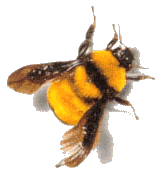 Honeybees Thrive
in New York City
By JIM FITZGERALD
Associated Press Writer
NEW YORK (AP) — Bears are nonexistent. Skunks are rare. Rats, pigeons
and humans, though plentiful, are reluctant to approach.
New York City, it turns out, is a great place to be a bee.
``They do really well here,'' says David Graves, who has hundreds of
thousands of honeybees in seven hives in Brooklyn, the Bronx and
Manhattan. ``There are so many parks and gardens and rooftop
flowerpots. Even if it's dry, they can get the water they need from the
East River.''
They mind their own beeswax, too, and don't go around stinging
sidewalk-bound New Yorkers, Graves insists. The hives are on rooftops —
as high as 12 stories — to keep them undisturbed.
``If you had a hive at street level, maybe somebody would knock against
it or something, and the bees would get riled and sting somebody,'' he
says.
Each of Graves' hives can produce 50 pounds of honey a year, which he
sells for $5 per half-pound at the city's greenmarkets. His ordinary
New
England honey is $3.
Graves, 48, has been raising bees for 15 years. He got the
up-on-the-roof
idea one spring after black bears raided hives near his Becket, Mass.,
home.
``To avoid the bears, we put the hives up high,'' says his wife, Mary.
``My husband had been selling at the New York greenmarkets for five
years, and he looked around and saw that one thing you have a lot of in
New York is rooftops.''
The next step involved a specific New York City skill: cajoling the
landlord.
``Sure, some people who said they'd love to have bees couldn't convince
their landlords,'' Graves says. ``But it wasn't a big problem. I'd
bring a
package of bees to the greenmarket in the spring, put a sign on them,
like, `We need a home. We are very gentle. We like to share our New
York City honey. Do you have a rooftop?'''
He got twice as many offers as he needed and hopes to expand next year.
Of course, bees don't just fly up to where you want them and fly down
when you want to move them. Like other tenants, they use the elevator.
Graves describes moving a hive so one building could repair its roof:
``I just put the hive in the elevator and brought it down, maybe 25,000
live bees in an elevator, 12 stories down. But the landlord was brought
up
on a farm, he knows they're not dangerous.''
Nobody else got into the elevator, he says.
On Wednesday, Graves took a visitor up on the roof of a summerhouse in
a community garden on the Lower East Side to show off one of his hives.
Bees were everywhere in the garden, feasting on sedum flowers, drinking
pond water from a lily pad. Hundreds swarmed around the boxy, wooden
hive, awaiting their chance to enter with whatever bit of nectar they'd
found in the Big Apple. Hundreds more took off, one by one like jets at
LaGuardia.
Inside, with thousands more bees, was the sticky sweet stuff that
Graves
extracts and sells as ``New York City Rooftop Beelicious Honey.'' At
Graves' ``Berkshire Berries'' stand at the Union Square greenmarket,
the
honey was displayed among the jams, jellies and maple syrup he brings
down from his Massachusetts home twice a week.
The New York honey has its own flavor, Graves said, but not because of
any gritty big-city aftertaste.
``It's because of the different flowers and different sources of
nectar,'' he
says. ``It's very flowery, definitely a different taste from the honey
that
comes from the Berkshires. People who have taste-tested here, blind
taste-tested, prefer the New York honey. It's sweeter.''
Graves' enthusiasm for bees goes beyond their honey, though; he's a bit
of a defense attorney for the insects themselves.
``The hardest thing is to get people to understand honeybees and not be
afraid of them,'' Graves says. ``They're not yellowjackets, not
hornets,
not so aggressive. You won't find honeybees on the peach you're eating
or
the Coke can in your hand.''
Next spring he'll get a chance to spread his enthusiasm. He recently
set
up two hives atop a public high school in the Bronx and hopes ``to show
the kids how it's done, extract some honey, show how the bees work.''
``It's farming that can be done right here in New York City,'' he says.
``That's my whole goal, to try to educate people, turn people on to
beekeeping here in the city.''
David Graves has hundreds of thousands of honeybees in seven hives in Brooklyn, the Bronxs and Manhattan. Each of his hives can produce 50 pounds of honey a year, which he sells for $5 per half-pound at the city's greenmarkets.
"Honeybees Thrive..." || A New Buzz... || Berkshire Berries
email: info@berkshireberries.com
| 
